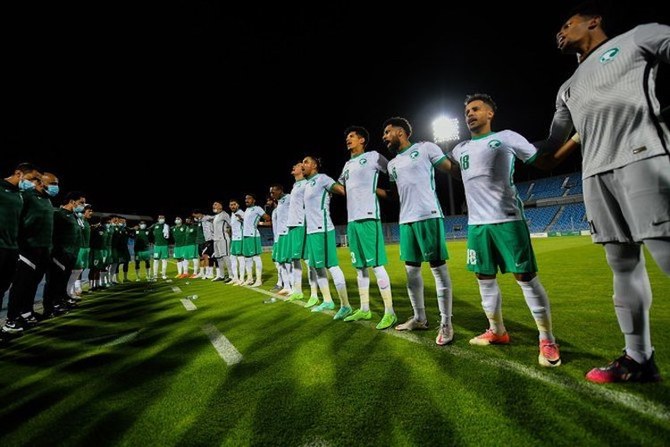RIYADH: The preparations are over and the next game for Saudi Arabia will be at the Tokyo Olympics against the Ivory Coast in their Group D opener in Yokohama on July 22.
It is a long-awaited fixture and not just because the 2020 Olympics have been delayed by a year due to the coronavirus pandemic, but because it will be the country’s first game at the event since 1996.
While the Atlanta tournament ended in three defeats, the buildup to this campaign has gone as well as it could have done. In the past six weeks alone, there have been training camps in Spain, with friendly games against Argentina and Mexico, back home in Saudi Arabia, including two tests against Uganda, and finally in Romania. Two games against that European team, which is also heading to the Olympics after a long gap (in fact, the last time Romania made it was when Tokyo last hosted the Games back in 1964), both ended in draws.
“We are taking things step by step,” said coach Saad Al-Shehri. “Our focus is currently on the Ivory Coast, how the team plays and how we deal with their strengths and weaknesses — this game will be key (if we are) to qualify for the second round.”
“We also have been working in non-competitive games to form the principles of how we play, and our identity.”
It is true that the Romanian tests were not about winning. The focus was much more on a final tune-up and giving as many players as possible some time on the pitch ahead of a very difficult Group D that includes Germany and Brazil, as well as the talented Ivory Coast. That could be seen by the amount of substitutions made by Al-Shehri.
In the first match on Saturday, when Salem Al-Dawsari equalized after 33 minutes to give the visiting team a 1-1 draw, the boss made eight changes in the second half. In Tuesday’s game, which ended goalless, there were a further eight substitutions made. What is of more interest is that the two starting lineups were almost the same, except that Al-Wehda midfielder Ayman Al-Khulaif was dropped to the bench for the second game and replaced by Ayman Yahya of Al-Nassr.
All three overage players — each squad is allowed three “wildcards” of any age in what is otherwise an under-23 tournament — started both games and looked solid. Al-Dawsari got the only goal of the 180 minutes and his movement also caused Romania’s defense problems, while his Al-Hilal teammate Salman Al-Faraj kept the ball well in the middle and was constantly looking for ways through the home team’s backline. Full-back Yasser Al-Shahrani, also of Al-Hilal, got forward well though, in truth, both games were fairly gentle affairs.
Romania coach Mirel Radoi was impressed, however. The 40-year-old knows Saudi football well after spending almost three seasons with Al-Hilal from 2009 to 2011, before moving to the UAE. The tough-tackling former defensive midfielder, who could also play at the back, was popular with fans and has been linked with a return to the Riyadh giants as a coach. He has other concerns on his mind, however, as he is also in charge of the senior Romanian side as they attempt to qualify for the 2022 World Cup.
“They gave us two good games,” Radoi said. “Saudi Arabian players have always been technically good and fast but I can see that they have become stronger tactically too. It was great to play against them and I hope they have a successful time at the Olympics.”
One issue for the Green Falcons is a lack of goals, with just four coming in the last seven games. Not enough chances have been made for striker Abdullah Al-Hamdan and coach Al-Shehri will be hoping that the new Al-Hilal star can burst into life in Japan or the criticism that he should have included Al-Nassr star Firas Al-Buraikan will intensify. At the back, however, the young Saudis are looking fairly settled, but they are sure to be tested by the talented forwards of Ivory Coast.
The Africans are due to arrive in Japan on Saturday after a disappointing preparation period. The runners-up from the African U-23 Cup of Nations in 2019 had been expecting to head to South Korea to face the East Asian team and France before taking on Saudi Arabia, but none of that has happened.
“It’s complicated for us because we haven’t prepared well for the Olympics,” said coach Soualiho Haidara. “We didn’t have the preparation we needed before leaving.”
Despite the problems, he is looking forward to the Saudi game. “We have an obligation to outperform ourselves,” he said. “We don’t go as designated victims. Trust us. We will do everything we can to be up to the task.”
So will Saudi Arabia.


























